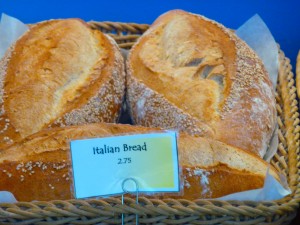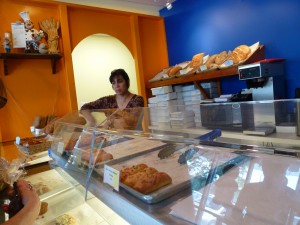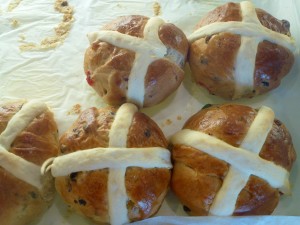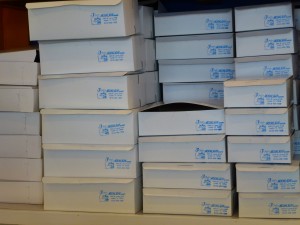While pondering the nature of our food system, I find parts of it in places that seem unrelated, at first. A bakery in Austin may seem connected to the system through the production of bread, the loaves and croissants traveling from the baker’s commercial kitchen into the hands and mouths of hungry Austinians every morning. But the system engages other less apparent components of the system, like dairy companies, flour manufacturers, and truck drivers. A recent visit to the bakery shed light on how these other companies contribute to the crusty loaves from one small bakeshop.
Derek Stilson, owner of Moonlight Bakery in Austin, Texas has been observing the moonlight for decades. A graduate from the University of Texas in Linguistics, he picked Moonlight for the name of his bakery with an eye towards descriptive meanings of words, connecting the moon, light, moonrise, and bread rising. Derek comes to bread through years of training, first as Whole Foods first in-house baker, then through stints at local Austin restaurants and bakeries before attending the American Institute of Baking in Kansas and teaching culinary arts at an Austin high school for eight years. Since 2003, he and his wife, Norma, owned the Moonlight Bakery, a small bakery that produces classic breads and pastries.
Derek comes to bread through years of training, first as Whole Foods first in-house baker, then through stints at local Austin restaurants and bakeries before attending the American Institute of Baking in Kansas and teaching culinary arts at an Austin high school for eight years. Since 2003, he and his wife, Norma, owned the Moonlight Bakery, a small bakery that produces classic breads and pastries.
While bakers adopt adjectives like “artisanal,” Derek simply bakes well-known and well-loved breads and pastries. During the week preceding Easter this year, his bakery case was bulging with Hot Cross buns, classic Easter treats, emblazoned with sugary crosses. The baked apple fritters revealed chunks of apples and cinnamon rolls could hardly contain the ribbons of melted sugar and spice within their creases. All sorts of classic breads filled the wicker baskets: whole wheat, multi-grain, Italian, sourdough, and focaccia breads and rye loaves. The ciabatta was perfect, a hard outside crust around a soft, chewy interior that filled the room with the aroma of caramel when toasted. It’s the kind of ciabatta that enveloped huge wells of butter and jam in pockets created by yeasty bubbles. A new restaurant, The Hillside Farmacy, in East Austin uses Moonlight ciabatta for a mushroom, caramelized onion, Brie sandwich.
Understandably, a visitor to the bakery could become transfixed by the scrumptious goods in the pastry case; but other sights in the small shop reveal other stories implicit in the provisioning of Austin with Derek’s admirable loaves. Piled high to one side, on pallets, were bags of flour awaiting entry to the back of the shop where the flour became bread. Two suppliers’ names identified the source of the bags: King Arthur Flour and Johnson Bros. Bakery Supply. Both purveyors provide histories that add texture to the bread supply chain. They also represent those many other players in the food system that are often over looked in the provision of some of our very basic food products. For the Stilsons, flour and baking pans are the bread and butter of their business.
King Arthur Flour is the oldest flour company in the U.S. Founded in Boston, Massachusetts 1790 by Henry Wood, the company sold flour imported from England and unloaded from British ships as they docked in Boston. The company began milling its own flour and by the 1890s announced its American-grown flour at the Boston Food Fair. Now, after 222 years, King Arthur flour operates from its corporate headquarters in Vermont, ideally suited to the state’s culture of culinary traditions. You can buy industrial bags of flour, like Moonlight Bakery does, or peruse American-made cookie sheets in King Arthur’s catalog. Moonlight, old-school with its line of classic baked goods, seems perfectly aligned with its source of flour from a company named after classic myths with deep historical ties to New England.
Johnson Bros. Bakery Supply Inc. lacks the long historical roots of King Arthur Flour but instead comes to Moonlight with connections to Texas history. Founded in 1994, a mere eighteen years ago, the company headquarters is in Houston. Two brothers raised by parents who ran bakeries in Minnesota and Texas, learned their trade by making doughnuts and decorating cakes. In the 1990s, they formed a company to supply the bakers, including the flour that sits in the front of Moonlight’s bakery shop. Twenty trucks deliver bakery supplies in Texas, operating in Texas and Oklahoma. The two brothers, Kevin and Blaine sell all kinds of bakery supplies, from flour to icing to chocolate for cake fillings.
These bags of flour, some from Vermont, some from Texas, convey an all-purpose, no frills approach to the Stilson’s bakery. They also represent two of dozens of other suppliers that bring paper bags, butter, eggs, cash register paper tape, and light bulbs. They all go into the loaf that Norma and Derek bake. Seems like to appreciate and understand how our food system works, we need to cast a wider net, think more broadly while we think deeply about the food we eat. Our findings may lead us to a much broader landscape that includes surprising participants in the business of feeding urban populations. Cookie sheet manufacturers, the fuel required to transport the sheets, the packing materials, labor, and metals used to produce the sheets, combine in our food networks. One inspired baker in Austin is only one location on the long road traveled by a grain of wheat to the breakfast table. Unraveling this network could be one of the most interesting and revealing projects yet.
But, do they have bear claws? My taste buds yearn for them with bubbling butter melted under the broiler. My uncle owned a bakery and this takes me down memory lane. LOL NRH 🙂